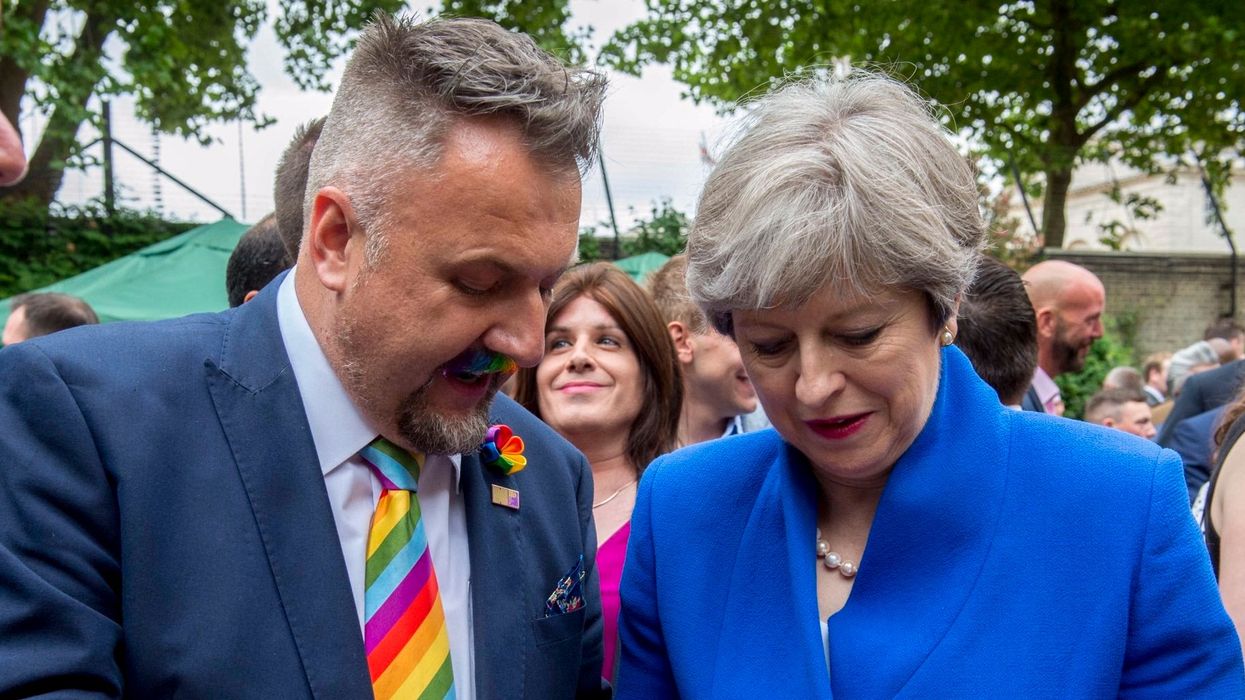News
Louis Staples
May 24, 2018

IMAGE:
Twitter/Theresa May
Marking the 30-year anniversary of Section 28, a homophobic law designed to prohibit the “promotion” of homosexuality, Theresa May announced a new "LGBT+ Action Plan" to improve lives of LGBT+ people in the UK.
In a letter penned to the LGBT+ community, the Conservative leader pledged her government’s support to “help make us a country where no one feels the need to hide who they are or who they love".
This follows a survey of LGBT+ people in Britain, which generated more than 100,000 responses, making it the largest survey of LGBT+ people anywhere in the world. Due to be released this summer, the action plan will be an official response to the survey’s findings.
The news comes as the UK falls to fourth in Europe in the Rainbow Index, a yearly ranking of the progress made in LGBT+ rights, having topped the list in 2012.
Though given the Conservative Party’s history of dragging their heels on LGBT+ rights, as well as May’s personal history of voting against progressive legal reform, not everyone is convinced. The Labour Party responded by labelling the plan as “empty PR”.
But in the absence of detail, what do prominent LGBT+ voices and organisations want to see in May’s action plan?
Paul Twocock, director of campaigns, policy and research at Stonewall UK, welcomes the Government’s intention to publish an LGBT+ action plan. Stonewall research reveals that 20 per cent of LGBT+ people have experienced a hate crime within the last 12 months. For trans people, this figure increases to a staggering 40 per cent. Paul believes that the action plan, combined with the government’s recently reaffirmed commitment to launching a consultation on reforming the 2004 Gender Recognition Act, will improve life for LGBT+ people in the UK.
Both the action plan and reform of the Gender Recognition Act should allow us to make important steps forward towards building a society where LGBT+ people are truly accepted, everywhere and by everyone; and it will mean this government can maintain the UK’s impressive record as a world leader on LGBT+ equality.
Susie Green, CEO of trans and gender identity charity Mermaids, cites hate crime as a major concern of trans youth. Susie believes that May’s action plan must urgently address this hostility, which is fuelled by sensationalist media coverage.
We need stronger controls around media coverage of transgender people, and particular attention needs to be given to the use of online media to perpetuate hate crime. Young people and trans women in particular are targeted on social media, with little done to protect them.
Susie would like to see statutory training for all areas of service around transgender children and young people, including schools, social care, police and healthcare. Lesson plans in school covering transgender identities should be mandatory, and included from primary school age.
Teachers need to be equipped to deal with conversations around transgender children and young people, which is clearly not the case at present.
Concerns over outdated sex and relationships education are also expressed by Liam Beattie, relationships and sex education policy lead at Terrence Higgins Trust. While Wales announced a progressive overhaul of their SRE curriculum, England still lags behind in its approach towards gender and sexuality in the classroom. Beattie explains that a lack of inclusive sex education at school made him feel “invisible”.
LGBT+ sex and relationships must be included when relationships and sex education becomes compulsory in all English schools from next year. Looking back, I’m still angry that I left school completely oblivious to the realities of HIV or the fact that, as a bisexual man, I was at higher risk than my sisters or straight friends.
My gaps in knowledge had to be filled through speaking to gay and bi friends or using dating apps. We can’t continue to let young people down like this.
The feelings of isolation and shame that follow so many LGBT+ people from childhood to adulthood can have a corrosive impact on their mental health. As a result, LGBT+ people are twice as likely to have a mental health condition compared to heterosexual people. Upon the announcement of May’s action plan, Paul Martin OBE, chief executive at LGBT Foundation, said:
LGBT+ people continue to face a significant number of inequalities from poorer physical and mental health, increased risk of hate crime and discrimination, to loneliness and isolation and negative experiences in employment and we hope that a commitment to tackling these key issues will be outlined in the upcoming action plan.
To alleviate these inequalities, human rights campaigner Peter Tatchell believes that the LGBT+ action plan must urgently confront homophobia in schools. He says:
Nearly half of all LGBT+ pupils have been bullied, often leading to anxiety, depression, truancy, academic under-performance and self-harm.
To combat anti-LGBT+ bullying and other forms of hate crime such as racism, the Prime Minister should make equality and diversity lessons mandatory in every school, from the first year of primary education onwards. The health and welfare of pupils must take priority.
There should be no opt outs for faith schools and no right of parents to withdraw their kids.
As Home Secretary, May faced criticism for her handling of asylum claims relating to sexual orientation and gender identity. At present, LGBT+ asylum seekers are still detained indefinitely, despite never having committed a crime. Leila Zadeh, executive director of the UK Lesbian and Gay Immigration Group, told indy100:
An action plan to improve the lives of LGBT+ people should include clear and tangible commitments to improving the wellbeing and safety of LGBT+ people who are seeking asylum.
As long as LGBT+ asylum seekers can be detained or made to share accommodation, there will be risks to their personal safety. The government should also review the quality of its decisions on asylum applications by LGBT+ people, to ensure none are returned to persecution
Nigerian LGBT+ rights activist Bisi Alimi would like to see a national monument commemorating the struggle for LGBT+ rights in the UK. He believes that this will help to imprint the memories of the LGBT+ movement in public consciousness.
This monument should put into account the individuals across race, gender, religion and age that have shaped Britain pre and post Section 28 and should form part of the school curriculum
Though while there are many voices welcoming the plan, there are also sceptics. Editor-in-chief of Attitude Magazine Cliff Joannou believes that, because of the government’s failure to introduce statutory LGBT+ inclusive relationship and sex education in schools, the legacy of Section 28 looms over schools and local authorities. He tells indy100:
For Theresa May to announce her 'LGBT Action Plan' in a gay magazine on the anniversary of Section 28 is both ironic and crass.
The government has shied away from tackling LGBT+ discrimination in faith schools, where homophobia and transphobia is most prevalent. Shockingly, conversion therapy is still legal in the UK.
While these issues continue to affect young LGBT+ people we will be far away from the equal society that the government likes to fantasise over.
Actions speak louder than words, and successive governments have failed to take any action on the very real issues that the LGBT+ community continues to face.
More: Wales 'leads the way' with new LGBT-friendly sex education curriculum
Top 100
The Conversation (0)
x













